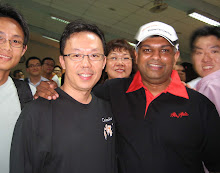 The 2nd Secret That Negotiators Won't Tell You -
The 2nd Secret That Negotiators Won't Tell You - Why They Object To Your Proposal
THE BOTHERING OBJECTIONS
Have you heard of people saying this to you over a sales or negotiating meeting:
“ I want to think about it. “,
“ I don’t like what you are offering me .”,
“ Are you out of your mind? You call that being fair? “ ,
“ Hey, you are pretty expensive!”
If you have been receiving these kind of reactions as a result of your communication with someone either at a business meeting or off the street regarding a potential trade, well, in fact, I believe you have just joined the rank of at least 80 % of the people on this planet who have been feeling mentally stressed and helpless because of such statements or unfriendly response.
How do you deal with people objecting to your proposal? When you are being objected to, what is your first reaction to their response?
Getting angry and frustrated, right?
If your reaction had been what I have just predicted, you would have fallen into what I call their “negotiation trap. “
Yeah, it’s a trap that is so big that you will be having a free fall right into the middle of the earth core. And it’s hot too!
Now, the crux of the issue is : WHY did they object to your proposal?
Ready for the 2nd Secret?
Here it is: “ They merely need to protect themselves!”
What? You might ask, they only do that because they need to protect themselves?
Wouldn’t you? When most people go to a sale , even with the price tag marking 70% off the normal retail price, they would still go for the thought that the price has not “ bottomed out”.
How many times have you seen shoppers carrying out the “ price execution order” to the retail assistant by asking this : “ Is there anymore discount? “ or “ Can you give me more discount? “
Go to http://www.4qctraining.com/cms/Default.asp?Page=70 and use this proven negotiation secret now!>>
Research shows that human beings have the natural instinct to defend and protect their self-interest when it comes to survival. Their intuition is to survive the challenging environment in a trade and people hate to be deceived if they find out that they don’t have a good deal. Well, we know that ‘s a matter of perception. But it’s true. I need to object first and check your response to see whether I have been right about my perception.
ACTION STEP
I need to understand the important fact that if people object to my proposal, it s not because of me, but because they need to protect themselves from getting a bad deal. I would do the same if I were them. That thinking will help me believe that the other party is not my enemy, but they can be my friends.
Use this proven negotiation secret now!>>
See you soon in my next Power Tip #4 on "The 3rd Secret That Negotiators Won’t Tell You- How You Can Handle Their Objections". Take care and this is TK from Fourth Quadrant Communications. Remember, negotiate with passion!
Cheers to your SUCCESS!
TK Chan
Certified NLP Master Practitioner (ABNLP)
Corporate Sales & Negotiation Trainer
http://www.4qctraining.com
http://nlpasia-tkchan.blogspot.com
About TK
He is the founder, principal master trainer and an internationally Certified NLP expert of Fourth Quadrant Communications (4QC), a training and speaking organization that conducts workshops and seminars for local and multinational corporations in the key areas of Neuro-Linguistic Programming & Hypnosis, personal change & effectiveness, psychological sales & negotiation, customer loyalty, high-impact presentation and leadership. You can consult him at 6013 -3954754 or email him at tk@4qctraining.com or info@4qctraining.com.







